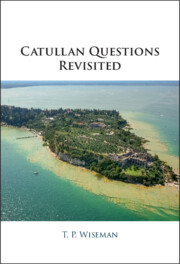Refine search
Actions for selected content:
2 results
Chapter 2 - How Many Books?
- from Part I
-
- Book:
- Catullan Questions Revisited
- Published online:
- 13 October 2022
- Print publication:
- 20 October 2022, pp 13-47
-
- Chapter
- Export citation

Catullan Questions Revisited
-
- Published online:
- 13 October 2022
- Print publication:
- 20 October 2022
